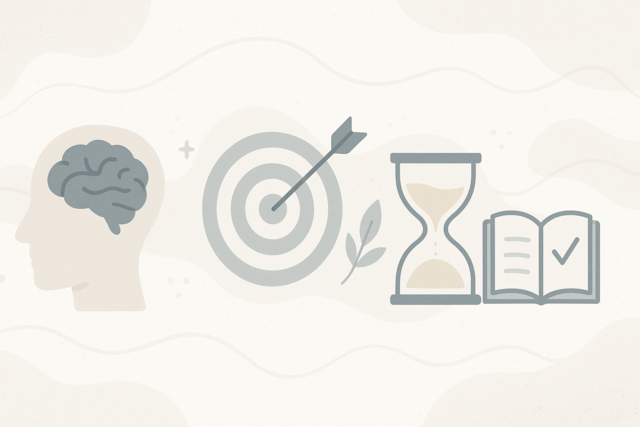Procrastination can be dubbed as a major concentration inhibitor; it is a type of behavior which is characterized by deferment of actions or tasks to a later time. We put things off because we have other more important things to do and suddenly we are scrambling for time. Procrastinating is simply non-productive and working on tasks that have been put off can sometimes lead to a less than perfect result. For example, you put off going to the grocery store for days, now today is the day when you are having company over for dinner. You have undoubtedly forgotten something on your list like bread, wine, napkins, or that special seasoning for your dip. Ultimately, you stress out and lose sight of the fun and enjoyment of having your dinner party. Hastily working through a project can often lead to mistakes and solid focus and concentration is near impossible. In another example, procrastination of housework other type of similar project can lead to an overwhelming mess of stress, that is certain to take much longer to accomplish, with headaches along the way.
Psychologists often times see procrastination as a mechanism for coping with the anxiety that is associated with starting or completing any task or making decisions. While the reasons will vary from person to person, procrastination may result in high stress levels, a sense of guilt, and the loss of personal productivity. These combined feelings can promote further procrastination. While it is normal for people to procrastinate to some degree, it becomes a problem when it interferes with normal day-to-day functions. Consistent procrastination may be a sign of an underlying psychological or physiological disorder.
Here are some common sense tips to get past putting things off:
Stress is another common reason that we can find it hard to concentrate. Stress is a part of life, and therefore we have to work around it to get the most out of our minds. The cause of stress is typically associated with work, school, family, relationships, and financial woes. While stress undoubtedly plays a role in our lives, we do not have to allow it to be leading actor/actress. It is clearly a matter of choice on how we choose to deal with stress and stressful situations. Stress is your body's reaction to what is happening around you and while we cannot eliminate stress, we can manage it effectively. While there are an immense number of ways that stress that come into our lives, here is a list of the most common - death of a spouse or loved one, divorce, marital separation, personal illness or injury, marriage, pregnancy, and retirement. These particular events have made the list of the top situations that can induce a stress filled environment. Not only can stress cause you an immediate reaction to these situations, but it can cause post traumatic stress disorder.
There are three common types of stress categories - physical, nutritional, and emotional. Emotional stress is the stress we think about the most when we talk about stress. Stress and stress related disorders are experienced by all on a regular, reoccurring basis. Nutritional stress can be described as a lack of certain nutrients that the body needs, and therefore reacts. Physical stress can be tied to the physical symptoms that can take place when enduring the effects of other types of stress. There is no doubt that stress is a part of life. It is common, and there are ways to live happily, healthy, and smart by getting a handle on the things that stress you most.
- Read the story below, do you think this stressful situation was handled appropriately?
Jane and her husband Jim have been married for nearly fifteen years. They are fairly happy and both have good jobs, but Jane recently found out that Jim has been gambling away money unnecessarily. He is good about paying the bills, but instead of saving extra money for an emergency fund or savings account deposit, he frequently treats himself to a night of gambling. Jane decides to confront Jim and have it out with him. Instead when we he comes she sits quietly and does not say a word. A few days later without talking, and Jane blows up at Jim for something that is fairly minor in the wake of their real issues. He is clueless, and she is simply enraged.
Class discussion - Read the story below, do you think this procrastination situation could have been avoided? If so how, and what would you have done differently.
Mary is a married and working mother of a teenage son. Her job keeps her very busy, her life in general is busy with her son's sports, various family functions, helping friends, and trying to spend time with her husband. Recently, Mary's mother hurt herself in an accident, to add to Mary's hectic schedule she now needs to go to her mother's at least twice a week to do laundry, dishes and other light housekeeping. During this time, Mary comes home at about 5 p.m. sits down get a snack, and watches an hour of her favorite home decorating shows. Sometimes she will just take off to her favorite store to buy things she really does not need, and shop around.
Deciding the best method and environment for your concentration to be at its peak can be hard, but not an impossible task. Based on what you need to accomplish, will likely determine the atmosphere for your task. For example, if you are working around the house, cleaning, etc you may enjoy loud music to motivate you in your chores. On the other hand, if you are working on a college paper, or writing project for work you may prefer a quiet more relaxed atmosphere.
There are various factors that can decrease our ability to concentrate effectively. Working through these obstacles means a clear open mind, and an enhanced level of thinking. By using some of the suggested techniques and tools, you may be able to enhance your abilities in your job, and in your personal. You may be able to pass along these techniques to friends and family who may experience some of the same issues that can cloud our focus and clear thinking.
EXERCISE
Now that you have read, and worked your way though this class, what differences do you think you will make in your concentration efforts? Will you try new ways of thinking, and focusing in order to enhance your memory skills? What if anything surprised you about the process of concentration and the outside factors that can so easily distract us in our day to day lives?
Undoubtedly, there are many ways to help in our goal of improved concentration, peak focus, and high intelligence. If you try something that you learned from this class and it didn't work for you, try something else. What works for your friend may not work for you and vice versa. While we are all made up of the same components, characteristically we are all very different.
You may assume that someone is smarter or better because they have a keen ability to retain a wealth of information. Just because you may not be to that level, does not mean you are not as capable. That is the wonderful thing about our brains, we can change the way they work! We can work on them and train them to be more powerful and enhance our ways of thinking and processing information. We have the control to anything and everything we want.
If you are currently frustrated by an inability of lack of concentrations, keep a positive outlook, a clear focus, and take your time. There is no timeframe on when and how you improve your concentration. It is at your own pace, and a constant learning process.
Keep in mind that concentration can also vary in terms of its intensity - from being weak to being intense. Concentration can also vary in terms of its duration. It is not always necessary to give your brain a workout over something like a minor issue that can be resolved quickly.





























